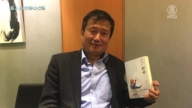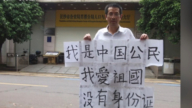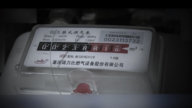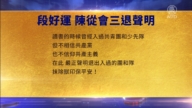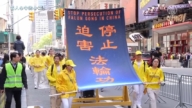【新唐人2014年08月27日訊】最近,中紀委巡視組承認95%的省份都存在地產腐敗問題。面臨8月將開始進行土地財政審計,有媒體說,很多官員會「睡不著覺」。不過專家指出,中共歷年都有土地財政審計,追究力度卻一直「雷聲大雨點小」,只有恢復土地私有制,才能從根本上杜絕地產腐敗問題。
據大陸媒體報導,國家審計署將從8月中旬開始,對過去6年的地方土地出讓收支、土地徵收、儲備、耕地保護,以及土地執法等情況進行審計。其中,2008年到去年的6年當中,地方政府總計約15萬億元的「土地出讓金」,將成為審計重點之一,而核心問題包括低價,或零地價,甚至負地價出讓土地、以及出讓後,擅自改變規劃條件等等。
8月初,在巡視組進駐上海和江蘇之際,黨媒說,巡視組發現95%的省份地產腐敗嚴重,專家建議,對房地產腐敗進行專項巡視。
實際上,在近期的反腐中,房地產也是落馬官員涉案最多的領域,而土地領域更是腐敗「重災區」。
大陸維權律師謝燕益:「在土地開發土地開發,土地出讓的過程中,所謂『公有制』,『國有制』,其實變相成了『官有制』,成了公權力或者專制權力所有,他們來分享這個利益。說得好聽點叫『分享』,說得難聽點叫『分贓』。人民的土地,變相的成了他們官僚權貴的資產了,不管從公平的角度,還是效益的角度都是於民於國有害無益的。」
當年轟動一時的「周正毅案」,就是時任上海市委書記黃菊,把上海黃金地段「東八塊」以零地價的方式,出讓給當時的首富周正毅。實質上,是變像的給了當時的黨魁江澤民等權貴,造成無數家庭流離失所、家破人亡。上海著名畫家何聲欽,就是因為「東八塊」強拆而死,至今屍骨還躺在太平間。
而近年來因為官員圈地,強佔強拆民房,造成自焚、自殺、挖掘車直接碾死土地使用者等暴力事件,一直在不斷的上演。
業內人士透露,因為土地成為各地官員和地方政府生錢的「活水源」,在土地出讓過程中,存在相當大暗箱操作的空間,「權力尋租」現象也非常普遍。
另外,由於地方政府違規、變相減免土地出讓金、用地單位拖欠土地出讓金,以及部份土地出讓金並沒有未納入基金預算管理等等問題,屢屢出現,在前幾年審查後,追究的力度往往「雷聲大雨點小」。
謝燕益:「必須進行產權的明細,進行市場經濟,充份保證私有制,私有制是天然的權利。在這個前提之下,國家可以授權政府管理我們的公共事務,但只是一部份,這一部份公共事務,是人們公共利益的一些交集。」
除了少數幾個共產主義國家外,在全世界都是土地私有制。中國歷史上幾千年來也是土地私有,只有共產黨進入中國,奪取政權後,進行所謂「土改」,才出現了所謂「土地公有制」、「國有制」。
謝燕益:「由於公有制,由於意識形態,一些所謂的歷史的原因,造成了我們現在一無所有,我們這些公民們生下來甚麼都沒有,而且我們很多權利被取奪,被官僚權利所壟斷,被專制權力所限制,這是不合理的。造成大多數人是『不得利益者』和『利益受損者』,那麼這個社會怎麼維繫呢。」
每經智庫專家蔡慎坤指出,中國房地產越來越脫離民生的本質,當蟻族擁擠在城市的地下室,為生計奔忙未來愁苦時,官員卻通過權力,輕而易舉獲得大量土地房產,以及花不完的黑錢,從而導致中國日趨嚴重的貧富分化、以及官民對立、仇官仇富的情緒。
採訪/易如 編輯/劉惠 後制/李勇
Public Land Ownership Blamed for China’s Rampant Real Estate Corruption
The inspection team of the Central Commission for Discipline
Inspection admitted recently that 95 percent of provinces
being audited have real estate corruption problems.
It is reported that with the real estate and finance audit
launched in August, many officials wouldn’t sleep well at night.
Some experts pointed out that though China already conducted
audits on real estate and finance over the years, they turned out
to be deceptive shows.
As a result, only after private land ownership is
restored can real estate corruption be rooted out fundamentally.
According to Chinese media reports, the National Audit Office
launched an audit in mid-August to check local governments’
land transfer payments, land acquisitions, land reserves,
farmland protection, and the enforcement of land laws
in the past six years.
Among others, a total of about 15 trillion yuan of the land
transfer fees collected by local governments over the past
six years since 2008 is one of the primary targets for auditing.
The core issues being investigated include selling land with
lower prices, zero land price, or even negative land prices
as well as changing planning conditions after the transfer,
and so on.
In early August, when the inspection team visited Shanghai
and Jiangsu Province, CCP-affiliated media reported that
the inspection team found that 95 percent of provinces
audited have serious corruption problems.
Some experts suggested that an exclusive audit
on real estate corruption be launched.
In fact, in the recent anti-corruption campaign, real estate was
the field that involved the largest number of government
officials accused of corruption, while land trading was also
a hard hit field.
Chinese civic rights lawyer Xie Yanyi: “In the process of land
development and land transfer, so-called public ownership
and state ownership have in fact turned into “official ownership."
They have become the privileges for law enforcers and
autocratic rulers to share the interests.
In other words, they are sharing the bribes.
People’s land became the bureaucratic elites’ private asset.
Regardless of whether we look at it from the perspective of
fairness or effectiveness, it is detrimental not only to the country
but also to the people."
Take the high-profile Zhou Zhengyi case for instance.
Former Shanghai Party Secretary Huang Ju sold the most
expensive land in Shanghai’s Eastern Eight Blocks to the
richest magnate Zhou Zhengyi with zero land price.
In fact, it was transferred to the powerful party leaders
including Jiang Zemin etc., making many people
destitute and homeless.
Famous painter He Shengqin in Shanghai died due to the
forcible demolitions in the Eastern Eight Blocks,
and his corpse is still lying in the morgue.
In recent years, violent cases of self-immolation, suicide, and
crushing land users’ bodies with excavators, etc. resulting from
officials’ enclosure of land, forcible appropriation or
demolition of private houses, have occurred continually.
Insiders disclosed that land has become the “living source"
of wealth for various local governments and officials at all levels.
During the process of land transfer, there is considerable room
for secret manipulation, and, “power rent-seeking" is also a
commonly seen phenomenon in China.
In addition, because local governments’ illegal waiver or
reduction of land transferring fees, land using agencies’ default
on land transferring fees, and local governments’ failing to
include land transferring fees in budget or management funds,
various problems occurred one after another.
But the results of dealing with these problems after the audit
was launched were not as was expected over the years.
Xie Yanyi: “Detailed registration of property, adopting market
economy system and full guarantee of private ownership are
what we must do.
Private ownership is a right by nature. Under this premise,
the nation may authorize the government to manage our public
affairs.
But it’s only the part of public affairs, which is the common
area of public interest."
Apart from a few communist countries, private land ownership
is adopted across the world.
Private land ownership had existed in China for thousands
of years throughout history.
Public land ownership and state land ownership
did not exist until the so-called “land reform" was launched
by the Chinese Communist regime after it took power.
Xie Yanyi: “Due to public land ownership, rigid ideology
and some historical reasons, we own nothing.
The citizens own nothing after we are born.
Besides, many of our rights have been removed, monopolized
by bureaucratic rights, restricted by autocratic power,
which is by all means unreasonable.
It has made most people become non-beneficiaries and
impaired stakeholders.
Then how can this society be maintained peacefully?"
NDB Think Tank expert Cai Shenkun pointed out that China’s
real estate situation is further and further away from the nature
of the people’s livelihood.
When average people are crowded in the basement and worried
about their livelihood, officials easily acquire lots of land
property by abuse of power.
As well as that, they have a large sums of money through
corruption.
It has resulted in the worsening divide of wealth, confrontation
between officials and ordinary people as well as people’s
hatred of officials and the rich.
Interview/YiRu Edit/LiuHui Post-Production/LiYong


